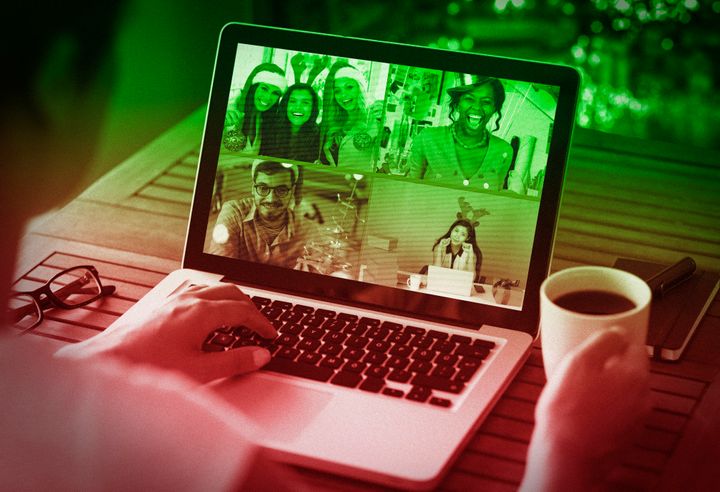
For Remote Employees, The Best Christmas Gift Is Acknowledgment
Article Published by: huffpost.com
Treat these workers as full members of the community by holding virtual holiday parties or email gift exchanges.
For Petrina Hurtado, this year’s office holiday party is a morning “Holiday Hobnob.” She and her colleagues are planning to drink coffee and cocoa together, and they will do it without meeting up in person. That’s because their holiday party is online.
“In the virtual work world, even just brushing your hair counts as dressing up,” joked Hurtado, who lives in Buffalo, New York. “But yeah, I’ll probably put on a Santa hat and get into the spirit.”
At the Fairfield, New Jersey-based Healthcare Businesswomen’s Association, the nonprofit for which Hurtado works as a membership manager, the remote workforce uses videoconference tools for corporate fun. Past holiday activities for employees have included ugly sweater contests and decorate-your-workspace challenges for which the person with the most festive space won a Starbucks gift card.
“We would take the webcam and move it around, and show our desk. Because we’re all virtual, we can get a little creative with where we’re working,” Hurtado said. During one holiday celebration, “I worked in my living room in front of my Christmas tree. Our executive vice president wore an elf hat with lights around it.”
Hurtado said this is the company’s third year of holding a virtual holiday event, but it also organizes Halloween, Memorial Day and other virtual happy hours. These get-togethers are a way to build connections with faraway colleagues.
“People want community. As much as you like working from home and having the flexibility, it can be very isolating,” Hurtado said.
What happens at the holiday party determines how employees feel for the year.
As more employees work from home, companies need to think beyond holding a physical gathering. In 2016, 43% of U.S. employees worked away from team members at least part of the time, compared with 39% in 2012, according to Gallup data.
For office workers who dread or sneer at corporate commitments to fun, the opportunity to miss a holiday party may seem like a perk. As one worker told HuffPost, “Trading office parties for remote work? Seems like a no-brainer. Office parties can be torturous.”
But a company holiday party is not just a party –- it’s an acknowledgment of your membership in a community and recognition of your work. When no option exists for you to participate in a holiday event, it can send a signal that you’re not a full member or fully appreciated.
Wade Foster is the CEO of Zapier, an automation service with a fully remote global workforce. Foster, based in Northern California’s Bay Area, said companies with remote employees send the wrong message when what they essentially communicate is, “‘We’re going to have a big company party at headquarters and if you’re not at headquarters, you’re invited. But we’re not going to pay for your plane ticket, we’re not going to pay for your hotel.’ They make it not practical for [remote employees] to participate in some of those things. It very much feels like a second-class citizen.”
Tammy Bruzon, a Catskills, New York resident who’s Hurtado’s colleague at HBA, said the holiday party can tell you how a company values its remote workers. “So much of what happens during the course of the year is on display at a holiday party,” Bruzon said. “If you dropped into random company X’s holiday party that has, let’s say, a sixth of its staff as remote, you could see exactly what their company culture looks like for remote workers” by “how they are or are not incorporated into the event.”
But companies who do remember to host remote workers are not always including them properly. Bruzon worked as a remote employee for a previous job as well. When she was videoconferencing into that company’s office holiday party, she said the event hit a “threshold where it feels like, ‘Well, I’m just sitting here watching you all have a good time, as opposed to you finding a way to include people who aren’t in the office.’”
In other words, just being invited to the party is not enough if you don’t feel welcomed to participate. Bruzon suggested that in order to make a holiday event inclusive for everyone, organizers could set a clear expectation that for the first half-hour employees are going “to talk about our greatest accomplishments from the year and what we want to bring into the new year.” Such basic face-to-face interaction that includes the whole group can make a difference, she said.
Including remote workers takes creativity, but it’s needed.
Planning ahead and setting expectations is key for a good time when everyone is remote. Even in a virtual happy hour, you still want face-time with your colleagues. Turning on the camera is “mandatory on our happy hours,” Hurtado said. Her advice for people who want to do their own virtual corporate fun is to first get buy-in from the company, to not schedule the party so late it in the day that it extends the workday even longer and to come prepared with conversation starters like, “Hey, what’s your plan for the holiday?”
Foster said as Zapier has grown, it has tried a number of scenarios over the years to build a positive culture for its remote employees.
If you are a group of less than 20 people, Foster recommends Conspiracy Santa, an email generator app Zapier created that facilitates a group Secret Santa program through which the whole team conspires to get a gift for one person. That way, if you do not know what to get a colleague you may not know well, you’ll have help from your other remote team members.
An instant messaging platform like Slack can be used for people to discuss their interests outside work. For Halloween, Zapier has a Slack channel to vote on the best dog costume. Employees can use videoconference tool Zoom to create a starship background for their Star Trek Halloween outfit. Fun can be organized around a hobby; in Zapier’s #Fun-DIY Slack channel, employees held a craft exchange for each other.
“As we’ve gotten bigger, there are little groups of folks with shared interests that come up with ways to celebrate and have fun with each other for the holidays,” Foster said.
Foster said his company gives a budget to employees who live in the same location so they can throw their own local holiday party if they want to meet up.
But what if you don’t have colleagues close, and live away from headquarters? Create your own party. That’s what Pam Selle, a software engineer who works remotely in Philadelphia for California-based HashiCorp, is doing. She’s co-organizing the Remote Philly holiday event, an in-person party open to anyone working remotely in any industry.
“I was interested in not just a remote worker holiday party as a way for people in the same company [to connect], but to unite around this idea of people who work remotely in Philadelphia,” Selle said.
“I’ve had virtual holiday parties for the companies I’ve worked at and it can be fun but there isn’t really a substitute for being around other human beings,” Selle said. The party will come with a built-in ice breaker: “Even though we don’t work for the same companies, we do have a common experience,” Selle said.
About Scott Livengood
Scott Livengood is the owner and CEO of Dewey’s Bakery, Inc., a commercial wholesale bakery with a respected national brand of ultra premium cookies and crackers.
Previously, Scott worked at Krispy Kreme Doughnuts for 27 years, starting as a trainee in 1977. He was appointed President of the company in 1992, then CEO and Chairman of the Board.
Scott has served on numerous boards including the Carter Center, the Calloway School of Business and the Babcock School of Management, Habitat for Humanity of Forsyth County, and the Winston-Salem Chamber of Commerce.
He started a new business, StoryWork International, in 2016 with Richard Stone. The signature achievement to date is LivingStories, a story-based program for improved patient experiences and outcomes in partnership with Novant Health.




